Chinese businessmen spin billions from animal-feed business
Updated: 2016-05-23 07:44
(Agencies)
|
|||||||||
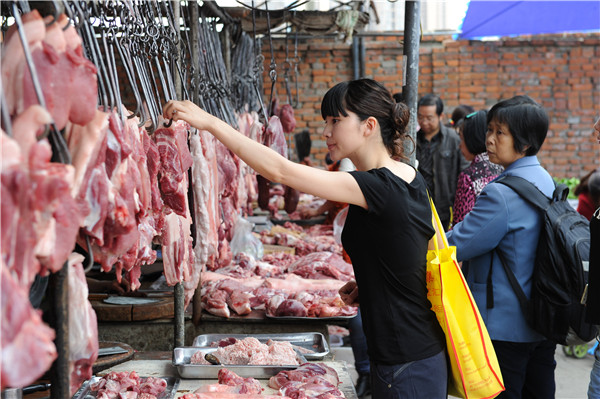 |
|
A woman picks pork chunks at a food market in Chengdu, Sichuan province. Sichuan is one of the largest pork production bases in China.XU CONGJUN/CHINA DAILY |
Big rise in pork consumption boosts livestock fodder industry in the country
China's appetite for meat has made billionaires out of two of the country's largest animal-feed providers. Bao Hongxing, chief executive officer of the closely held Twins Group Co in Jiangxi province, China's fifth-largest animal-feed producer, has a $1.8 billion net worth, according to the Bloomberg Billionaires Index. Chen Yuxin, founder of closely held Sichuan Tequ Investment Co, Sichuan province's biggest animal feedmaker, has a fortune valued at more than $1 billion.
The two tycoons are benefiting from growing demand for healthier livestock as the world's most populous nation prods farmers to provide higher-quality pork, chicken and beef. The country is also seeking to reduce its dependence on cheaper, low-protein staples such as rice, corn and soybeans.
"It is impossible to lose money in the animal-feed industry in China right now, unless you have an internal management problem," said Wang Qian, a Shanghai-based agriculture analyst at Guotai Junan Securities Co. "Fewer than 20 percent of China's livestock farming companies make their own feed and are self-sufficient, while 80 to 90 percent of them have to buy feed from feed companies."
Not only has the shift to meat boosted demand for domestic feed and turned China into the world's biggest animal feedmaker, the country breeds and eats more pigs than anywhere else on the planet, according to the Ministry of Agriculture. Its largest farms are benefiting the most because they're most able to afford investing in the facilities and ingredients needed to meet the government's guidelines for safety, quality and environmental protection.
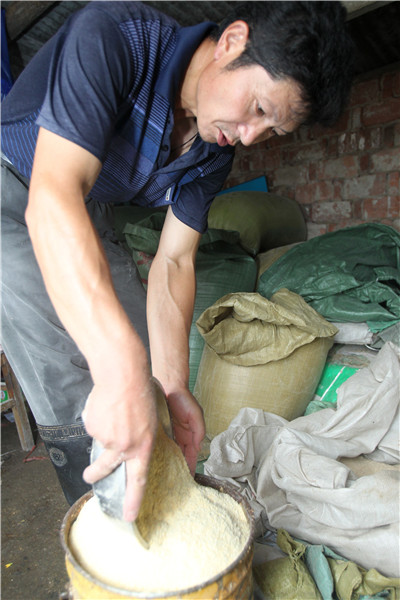 |
|
A farmer prepares feed at a pigsty in Nantong, Jiangsu province. Chinese consumers' huge demand for pork products has prompted rapid development of the country's animal-feed industry.XU CONGJUN/CHINA DAILY |
On the flip side, smaller companies have suffered. The number of China's feed mills has fallen to 6,000 from 10,000 in 2010 as family-owned businesses were shuttered, Wang Junxun, a vice-director at the agriculture ministry, said.
The surviving mills produced 200 million tons of animal feed in 2015, a 23 percent increase from 2010 and accounted for about one-fifth of global output, according to China's agriculture ministry.
Twins Group had revenue of 38.6 billion yuan ($5.94 billion) in 2015 after surging at a compounded annual growth rate of 50 percent from 2004 to 2014, according to Cai Li, Bao's assistant, who declined to comment on the net worth calculation.
Bao, 52, invested 500,000 yuan for a 17 percent stake in what was then called Golden Apple Group, and became one of its biggest shareholders in 2001. The company, which changed its name to Twins Group in 2007, is China's largest producer of pig feed, according to the group's website.
He shares the stake with his wife, Hua Tao. Family members, including his sister and two brothers-in-law, own another 29 percent of the company. None of the family members have a stake valued at $1 billion or more.
Chen, 66, owns West Hope Group, a closely held conglomerate whose businesses include tourism, education and investments. It split off the animal-feed business in 2005 as Sichuan Tequ Investment Co, a partnership with closely held Pu Hua Agriculture & Technology.
West Hope has a 55 percent stake in the feed business, which had a revenue of more than 13 billion yuan in 2015 and represents about 70 percent of the group's total, according to spokesman Wang Linnong, who declined to comment on Chen's net worth.
Both billionaires benefited from decisions made by China in 1985, when the government liberalized its domestic grain industry and made livestock production a priority, according to the State Council Information Office.
Chen didn't start out rich. He was abandoned at age two and placed under foster care in the farming village of Gujia because his family couldn't afford to feed four sons and a daughter. He reconciled with his biological family, the Lius, in 1963 after returning to Xinjin to attend middle school, according to West Hope Group.
After graduating from Sichuan Agriculture University in 1982, Chen worked as a government employee for the Xinjin Agriculture Bureau. He quit after six months and returned to Gujia and began raising quail and chickens.
The brothers soon pooled their capital and started a business with 1,000 yuan, expanding into the feed business in 1992 and forming the Hope Group. Together they built a collective net worth of more than $15.9 billion, China's second-largest family fortune, according to the index.
They diverged in 1995, splitting the business in four equal parts as a way to avoid a family dispute. Both Liu Yongxing and Liu Yonghao remained focused on agriculture while expanding into heavy chemical industry and real estate industry, respectively.
Liu Yongxing started East Hope Group, building a net worth of $9.3 billion, according to the index. Liu Yonghao, the youngest brother, founded New Hope Group and built a $5.5 billion fortune.
The eldest, Liu Yongyan, left the feed business and formed Continental Hope Group, which sells mechanical and electrical appliances. His net worth could not be verified due to the lack of disclosed financial information.
Chen also holds 1 percent of publicly traded New Hope Liuhe Co, an animal feed and agricultural products maker owned by his younger brother Liu Yonghao, according to Liuhe's 2015 annual report.
Today's Top News
Wreckage of crashed EgyptAir plane found at sea
Still learning
EgyptAir denies finding wreckage of missing flight
China urges US to halt close surveillance
Debris found in sea in search for missing MS804
LinkedIn matches refugees with jobs
Top legislator foresees bright future for SAR
UN climate talks resume to write 'rule book'
Hot Topics
Lunar probe , China growth forecasts, Emission rules get tougher, China seen through 'colored lens', International board,
Editor's Picks
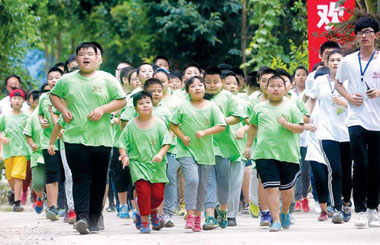
|

|
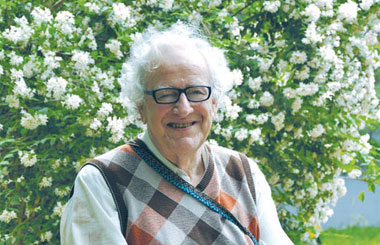
|
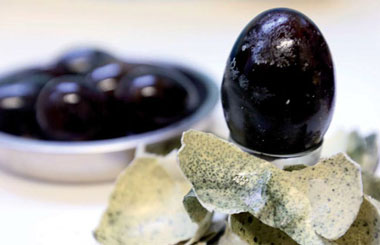
|

|

|







